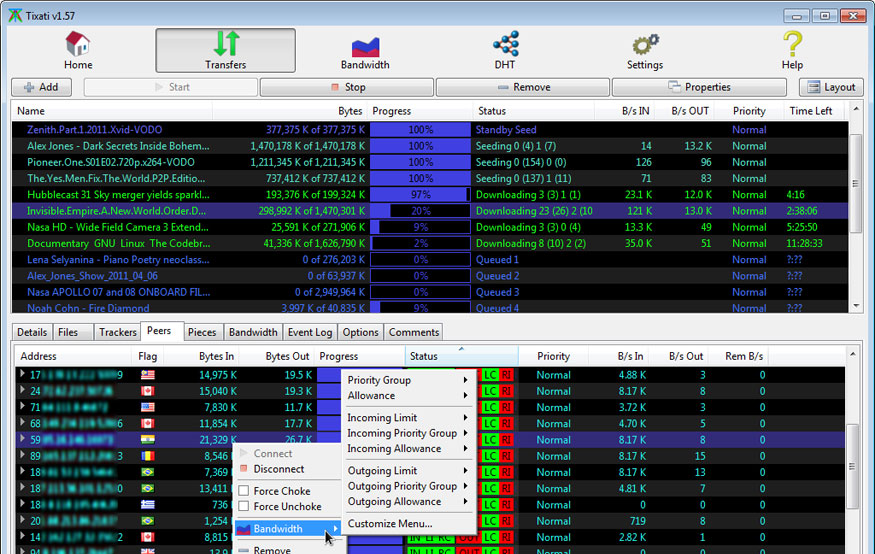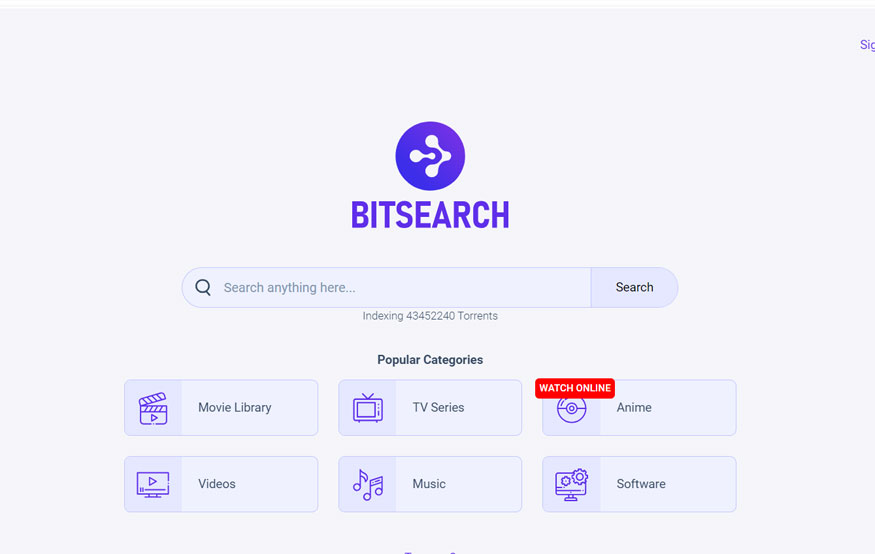Torrent Search Engines: Navigating the World of Peer-to-Peer File Sharing
As a tech-savvy business consultant with years of experience implementing various software systems across industries, I’ve witnessed the evolution of file-sharing technologies.
SORT
Learn why SEO Testing Tools is free?
SEO Testing Tools is free for users because vendors pay us when they receive web traffic and sales opportunities.
SEO Testing Tools directories list all vendors—not just those that pay us—so that you can make the best-informed purchase decision possible.
276.69K reviews
391.53K followers
- 227.1K users like this
- This launch happened 16 years ago
Tixati offers fast, efficient torrent downloading with a user-friendly interface. Key features include bandwidth management, detailed statistics, and no ads, enhancing user experience and performance.
LICENSE MODEL
Freemium
PRODUCT MODEL
Proprietary
PLATFORMS
- Windows
- Linux
Tixati CATEGORIES ON SEOTESTINGTOOLS.COM
Tixati FEATURES
- Sequential download
- Torrent Search Engine
- Auto-categorize
- Sync iTunes Libraries
- Peer-To-Peer
- Portable
- Stream audio
- Decentralized
- Remote Management
- Media Streaming
- Ad-free
- Customizable
- Tag based
293.69K reviews
450.63K followers
- 304.05K users like this
- This launch happened 4 years ago
Bitsearch is a DHT-based torrent search engine that offers decentralized search capabilities, fast results, enhanced privacy, and extensive indexing, providing users with efficient and secure access to torrent files.
LICENSE MODEL
Freemium
PRODUCT MODEL
Proprietary
PLATFORMS
- Online
Bitsearch CATEGORIES ON SEOTESTINGTOOLS.COM
Bitsearch FEATURES
- User-Friendly Interface
- Community Features
- Torrent File Management
- Privacy and Security
Learn More About Torrent Search Engines
Table of Contents
Torrent Search Engines: Navigating the World of Peer-to-Peer File Sharing
As a tech-savvy business consultant with years of experience implementing various software systems across industries, I’ve witnessed the evolution of file-sharing technologies. Today, we’ll dive deep into the world of torrent search engines, exploring their functionality, popular platforms, and the considerations users should keep in mind. Let’s embark on this digital journey together!
Understanding Torrent Search Engines
Torrent search engines have become an integral part of the internet landscape, revolutionizing how we share and access digital content. But what exactly are they, and how do they fit into the broader ecosystem of file sharing?
At their core, torrent search engines are specialized platforms that allow users to find and download torrent files. These files contain metadata about the content you want to download and information about where to find it across a distributed network of users. It’s like having a treasure map that leads you to pieces of digital gold scattered across the internet!
The Evolution of Torrent Technology
To truly appreciate the current state of torrent search engines, we need to take a quick trip down memory lane. Remember Napster? It was the granddaddy of peer-to-peer file sharing, bursting onto the scene in the late ’90s and changing the game forever.
From Napster to Modern Torrent Platforms
Napster’s reign was short-lived due to legal challenges, but it paved the way for more sophisticated and decentralized file-sharing protocols. Enter BitTorrent, the technology that powers modern torrent networks. Unlike Napster’s centralized approach, BitTorrent distributes files across multiple users, making it more resilient and efficient.
This decentralization led to the birth of torrent search engines as we know them today. These platforms don’t host the files themselves but provide a way to find and connect to other users who have the content you’re looking for. It’s like a digital potluck where everyone brings a dish to share!
How Torrent Search Engines Work
Now that we’ve covered the basics, let’s pop the hood and look at the inner workings of torrent search engines. Understanding this can help you navigate these platforms more effectively and make informed decisions about their use.
The Mechanics Behind Peer-to-Peer File Sharing
When you use a torrent search engine, you’re essentially tapping into a vast network of users who are both uploading (seeding) and downloading (leeching) files. The search engine itself is just the middleman, helping you find the torrent files that point to the content you want.
Here’s a simplified step-by-step breakdown:
- You enter a search query on the torrent search engine.
- The engine scours its database of torrent files and presents you with results.
- You choose a torrent and download the .torrent file or magnet link.
- Your torrent client software uses this information to connect to other users who have the file.
- The file is downloaded in pieces from multiple sources simultaneously.
It’s like a digital potluck where everyone brings a dish to share, but instead of food, you’re sharing bits and bytes of data!
Top Torrent Search Engines in 2023
The landscape of torrent search engines is constantly evolving, with new players emerging and old ones adapting to stay relevant. Let’s look at some of the most popular and reliable platforms as of 2023.
1. The Pirate Bay: The Resilient Pioneer
The Pirate Bay (TPB) is the grizzled veteran of torrent search engines. Founded in 2003, it has weathered numerous legal storms and takedown attempts, always managing to resurface. Its simple interface and vast library of torrents make it a go-to for many users.
Key Features:
– Massive database of torrents
– User comments and ratings
– Magnet links for faster downloads
However, be aware that TPB’s resilience comes with risks. It’s often a target for copyright enforcement, and the quality of torrents can be hit-or-miss.
2. 1337x: A User-Friendly Alternative
For those who find The Pirate Bay a bit too bare-bones, 1337x offers a more polished experience. Its intuitive interface and curated content make it easier to find high-quality torrents.
Highlights:
– Clean, ad-light design
– Active community moderation
– Categorized content for easy browsing
1337x strikes a nice balance between functionality and user experience, making it a solid choice for both newbies and experienced torrenters.
3. RARBG: Specializing in High-Quality Content
If you’re particularly interested in HD video content, RARBG should be on your radar. This platform is known for its focus on high-quality releases, especially for movies and TV shows.
Standout Features:
– Verified torrents for added security
– Detailed information about file quality
– Regular updates with new content
While RARBG’s specialty is video content, it also offers a wide range of other file types, making it a versatile option for various needs.
Legal and Ethical Considerations
Now, let’s address the elephant in the room. The use of torrent search engines and downloading copyrighted material without permission is illegal in many jurisdictions. As a business consultant, I can’t stress enough the importance of understanding and respecting intellectual property rights.
Navigating the Gray Areas of Torrent Usage
While torrent technology itself is neutral, its use often ventures into murky legal waters. Here are some key points to consider:
- Copyright Infringement: Downloading copyrighted material without permission is illegal in most countries.
- Legal Torrents: Not all torrents are illegal. Many open-source projects and content creators use torrent technology for legitimate distribution.
- Risk of Malware: Torrents from unverified sources can potentially contain malicious software.
- ISP Monitoring: Your internet service provider may monitor torrent activity and take action against copyright infringement.
Remember, as a professional, it’s crucial to lead by example and use technology responsibly. Always seek legal alternatives when possible, especially in a business context.
Ensuring Safe and Secure Torrent Downloads
If you do choose to use torrent search engines, it’s essential to prioritize your digital safety and privacy. Here are some best practices to keep in mind:
Best Practices for Protecting Your Digital Footprint
- Use a VPN: A Virtual Private Network can help mask your IP address and encrypt your internet traffic.
- Stick to Reputable Sources: Use well-known torrent sites and look for verified or trusted uploader tags.
- Keep Your Antivirus Updated: Always scan downloaded files before opening them.
- Use a Dedicated Torrent Machine: If possible, use a separate computer or virtual machine for torrenting to isolate potential risks.
- Read Comments and Ratings: User feedback can provide valuable insights into the quality and safety of a torrent.
By following these guidelines, you can minimize the risks associated with using torrent search engines. Think of it as wearing a digital seatbelt – it doesn’t guarantee safety, but it significantly reduces the chances of harm.
The Future of Torrent Search Engines
As we look ahead, the world of torrent search engines continues to evolve. With increasing pressure from copyright holders and law enforcement, these platforms are constantly adapting their technologies and practices.
We’re likely to see more decentralized and blockchain-based solutions emerging, aiming to create more resilient and censorship-resistant networks. However, this will also bring new challenges in terms of regulation and user protection.
As technology professionals, it’s our responsibility to stay informed about these developments and guide our clients and organizations towards legal and ethical use of file-sharing technologies.
In conclusion, torrent search engines represent a powerful but controversial aspect of internet technology. While they offer unparalleled access to a vast array of digital content, they also come with significant legal and security risks. As we navigate this complex landscape, it’s crucial to prioritize ethical considerations, respect for intellectual property, and personal digital safety.
5 Unique FAQs
-
Q: Are all torrent search engines illegal?
A: No, torrent search engines themselves are not illegal. However, using them to download copyrighted material without permission is illegal in many jurisdictions. -
Q: Can I get caught using torrent search engines?
A: Yes, it’s possible. Many ISPs monitor torrent activity, and copyright holders actively track illegal downloads. Using a VPN can provide some protection, but it’s not foolproof. -
Q: What’s the difference between a torrent file and a magnet link?
A: A torrent file contains metadata about the files you want to download, while a magnet link is a more streamlined way to share this information without a separate file. Magnet links are becoming more popular due to their convenience. -
Q: How can businesses leverage torrent technology legally?
A: Businesses can use torrent technology for distributing large files efficiently, such as software updates or open-source projects. It’s a cost-effective way to handle high-bandwidth distribution. -
Q: What are some legal alternatives to torrent search engines?
A: There are many legal streaming and download services available, such as Netflix, Spotify, or Steam for games. For software, consider open-source alternatives or subscription-based services that offer legal access to a wide range of tools.









